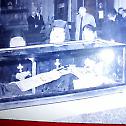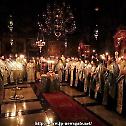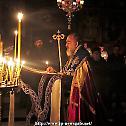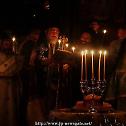The Feast of the Translation of the relics of St. Savvas The Sanctified in the Holy Land
On Thursday, 13th/26th October 2017, the Patriarchate observed the memory of the translation of the relic of our Father among the Saints Savvas the Sanctified in his Holy Lavra. This feast has been established in the Church of Jerusalem since 1965, when on 13th/26th October of that year, the holy relic of St. Savvas was returned from Venice, where it had been transferred by the Crusaders.
This all-night vigil feast was officiated by H.H.B. our Father and Patriarch of Jerusalem Theophilos, with co-celebrants the Most Reverend Metropolitan Joachim of Helenoupolis and Geronda Secretary-General Most Reverend Archbishop Aristarchos of Constantina, the Spiritual Father of the Monastery Reverend Archimandrite Eudokimos and other Hieromonks and Priests. The Choir leader of the All-holy Church of the Resurrection Archimandrite Aristovoulos sang in Greek and the Hegoumen in Acre, Archimandrite Philotheos in Arabic, along with Fathers from Mount Athos, with the participation in prayer of St. Savvas’ monks and others, and Arab-speaking pilgrims from Bethlehem, Beit Sahour and Beit Jalla.
His Beatitude preached the divine word to this congregation as follows:
“ Savvas the Sanctified lived in this brook, which stems from Siloam, in solitude for five years, conversing with God and striving to cleanse the eyes of his mind in order to “behold with an open face as in a mirror the glory of the Lord” (2 Cor. 3:18), having had defeated the evil spirits by his unceasing prayers and closeness to God” St. Savvas’ biographer, Cyril Skythopolitis says.
Beloved Brothers in Christ,
Noble pilgrims
Let us give thanks unto the Lord our God Who deemed us worthy to visit His Holy Temple (Ps.27:4) which was built by our Father among the Saints Savvas at the place of the brook where he lived in monastic striving.
The Holy Church of Jerusalem is rejoicing exceedingly in today’s 52nd festal anniversary of the translation of the incorrupt relic of our Father among the Saints Savvas the Sanctified , in this sacred place where he was conversing with God “beholding the beauty of the Lord” (Ps.27:4) living in solitude and silence.
Our Father Savvas managed to have the vision of the beauty of God “having cleansed the eyes of his mind”. In this arid rough desert, St. Savvas tasted the fruits of the unity with God, Whom he loved with all his mind and soul. For this reason he would say along with the psalmist: “Thou wilt shew me the path of life: in thy presence is fulness of joy; at thy right hand there are pleasures for evermore” (Ps. 16:11). And in more detail; You have made me aware of true ways of the blessed life here. You will fill me with joy when I also behold Your face there. Under Your protective right hand Lord there are endless and infinite pleasures and joy.
A truthful witness and tangible proof that our Father among the Saints Savvas enjoyed in his earthly life the vision of the glory of God, is his incorrupt relic which lies before our eyes. An additional proof of this fact is the unceasing throughout the centuries operation of this Holy Lavra of St. Savvas, and the presence of the monks in it, who strive in ascesis and unceasing prayer.
In our contemporary era, my dear brothers, where creation is adored rather than the creator, and the spirit of fallacy, namely of the antichrist, is dominant as St. John the Evangelist says (1 John 4:3,6), this Holy Lavra and the relics of St. Savva in it, is projected as a bright beacon, leading us into the safe harbour of salvation, namely our Holy Church of Christ.
And we say this, because St. Savvas the Sanctified calls upon all of us, who believe and confess the incarnate Jesus Christ (1 John 4:2), to cleanse “the eyes of our mind” through unceasing prayers and “the closeness to God”, if we actually want to consider ourselves Christians and active members of the mystical body of Christ, namely the Church. Amen.”
After dismissal, the boiled wheat and the meal, His Beatitude returned to Jerusalem via the Monastery of St. Theodosios the Coenobiarch.
Source: Patriarchate of Jerusalem














